In many ways, the passing of Lee Kuan Yew, brings to a close the formative history of Singapore. Lee, who passed away at age 91, was the island-state’s founding prime minister and the last surviving member of a team of indomitable spirits that included Goh Keng Swee, S. Rajaratnam, and Toh Chin Chye. Together, these men, and the people who worked for them, steered newly-independent Singapore through the stormy years of separation from Malaysia in 1965 and the height of the Cold War in Southeast Asia, and in the process created the vibrant, first world metropolis the world has come to know.
Much has been written about Lee Kuan Yew; the material available on the man and his ideas would easily fill a library. Whether authored by admirers or detractors, the vast majority of what is written about Lee shares one common thematic thread—an emphasis of his hardnosed pragmatism and instinct for survival. Indeed, Lee’s stubbornness and strategic foresight were legendary. Guided by Machiavellian principles, he was never one to cave in to popular opinion, and held the view that leaders should be feared and not necessarily liked or loved.
Given this characterization of Lee—a characterization often repeated by those who worked closely with him—it would seem that trying to detect elements of idealism in his thinking is nothing short of a fool’s errand.
The Oxford Dictionary defines idealism as “the practice of forming or pursuing ideals, especially unrealistically.” This is not a character trait that one would typically associate with Lee Kuan Yew. I would suggest however, that at an absolutely crucial point in Singapore’s history, it was a combination of idealism and vision on the part of Lee and his colleagues that led them to set Singapore on the “unrealistic” path of embracing an independence that was thrust on them, and transforming their island within a generation from a declining regional entrepôt into a renowned international center for manufacturing, technology and financial services.
Paths not chosen
When Singapore was booted out of the Federation of Malaysia on 9 August 1965 and left to fend for itself, what it needed was not a hardnosed pragmatist, but an idealist with a vision of an independent Singapore that would stand out from its neighbors, all bogged down in the dire conditions that defined Cold War Southeast Asia.
On that fateful day in 1965—neither the time nor the circumstance of its own choosing—Singapore found itself in an exceedingly hostile strategic environment. A few hours after separation was announced, Malay ultranationalists from Malaysia, keen to take Lee to task for his audacity in questioning Malay supremacy in the country, were already talking about retaking Singapore. Across the Strait of Malacca, Indonesian President Sukarno’s Confrontation policy was still in place, aimed not only at Malaysia but Singapore as well. Further north, the Vietnam War was on the verge of escalating. In essence, as the Cold War was raging, Southeast Asia was bearing the brunt of its “hot” elements, and the Domino Theory articulated a very plausible strategic outcome for the non-communist states in the region, particularly given concerns of Soviet-Chinese collusion (the Sino-Soviet split was not known to the outside world at the time).
It is easy in hindsight to say that Lee and his compatriots had no choice but to set Singapore on the course of independence. But this claim downplays the seriousness of what confronted Singapore at the time, how carefully alternatives had to be pondered before a path was chosen, and the vision and idealism involved in imagining a course after independence.
Given the strategic circumstances, could the “pragmatist” Lee have chosen to pull his punches during the merger with Malaysia, rather than spend the those two years (1963-1965) promoting an alternative social-political-economic order to Malay supremacy, so as to secure Singapore’s immediate viability as a political and economic entity as part of Malaysia? After Separation, could Singapore not have become a satellite of the United States the way South Vietnam was, or a treaty ally like the Philippines? Could it not have chosen the path of “Finlandization” in order to blunt any potential Malaysian or Indonesian aggression? All this may seem unrealistic, even ludicrous, in hindsight. But back then, it would not at all have been beyond the pale. In fact, if we consider the policies that smaller states chose during this period—Cambodia, for instance—it could even be argued that any of these postures would be more “realistic” and “pragmatic” than the small island-state of Singapore, without natural resources or a hinterland and vulnerable to ethnic tension, staying independent and on its own. Lee himself said that Singapore was an “improbable, unlikely nation.”
But, as we know, Lee Kuan Yew and his colleagues decided to go it alone, against all odds, and Lee’s adroit maneuvering between the United States and the People’s Republic of China during those Cold War years eventually ensured that Singapore was able to keep a necessary distance from either camp. Yet it was Lee’s idealistic vision—and those of his colleagues as well—in those early weeks and months of independence that dared to dream a dream that was not dictated by the strategic circumstances. Not only that, it was their idealism that inspired those who chose to remain on the island to believe in the vision that Lee and his colleagues had for a sovereign and successful Singapore.
Doubtless, pragmatism was required in order to keep the dream alive. Lee would go on to develop an international reputation as a politician of singular intellectual ability and fearsome personality, commanding more respect than affection. But back in early August 1965, the dream of a successful, independent Singapore that manages to surmount its innate vulnerability could only have been dreamt by an idealist and a visionary. And as we remember Lee Kuan Yew’s remarkable contributions to Singapore, it would be a great disservice to his memory if we do not consider this aspect of his leadership in those trying, early years.
The Brookings Institution is committed to quality, independence, and impact.
We are supported by a diverse array of funders. In line with our values and policies, each Brookings publication represents the sole views of its author(s).

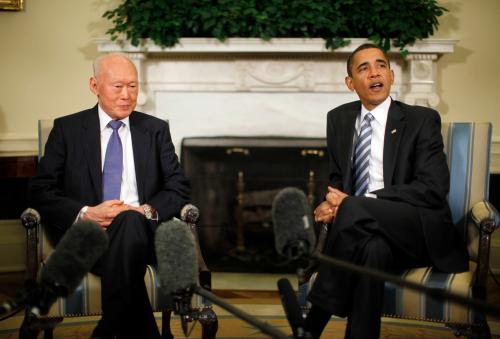
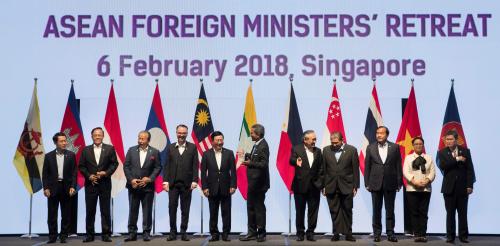

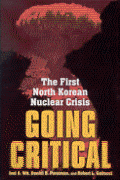
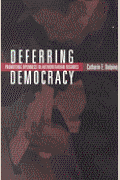
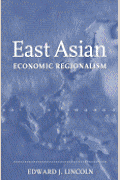
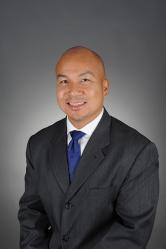

Commentary
Lee Kuan Yew: The man and his dream
March 22, 2015